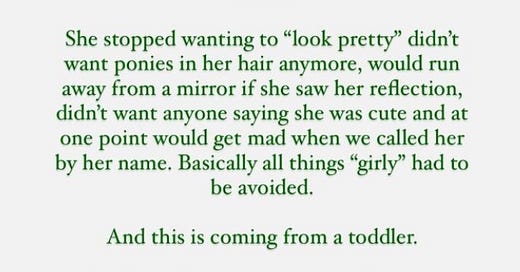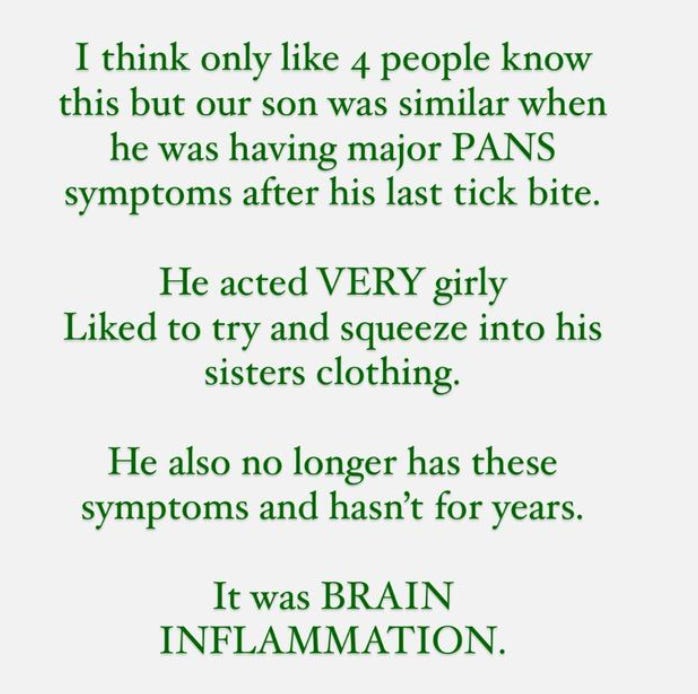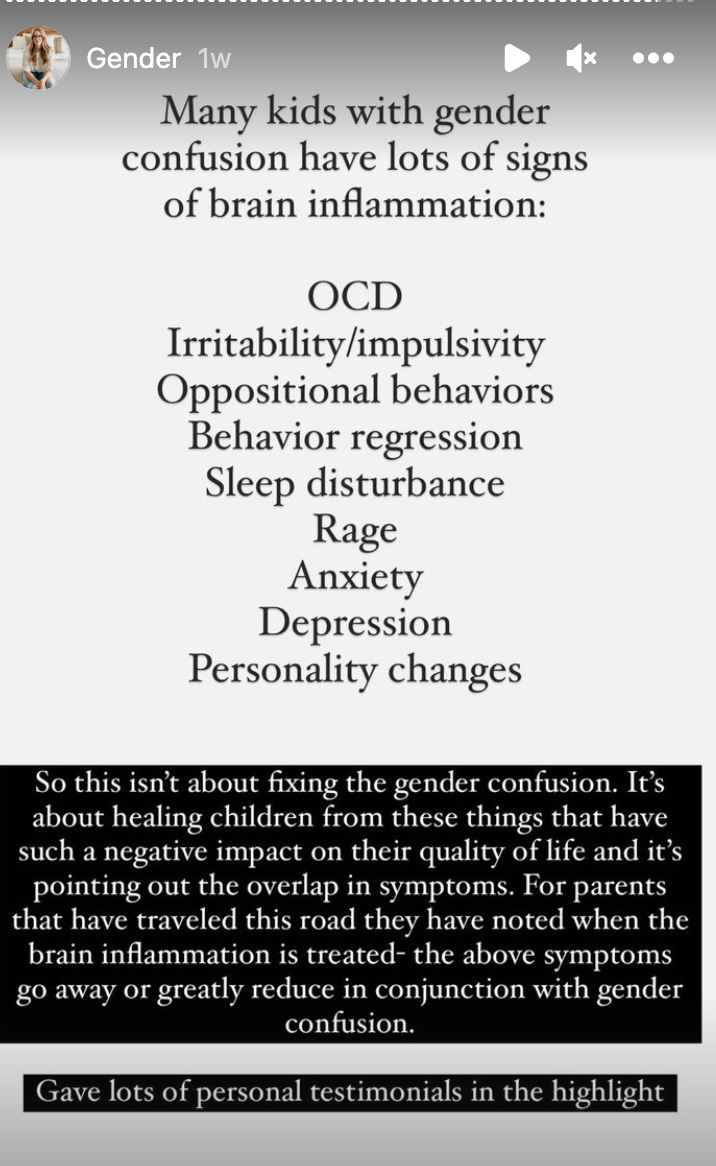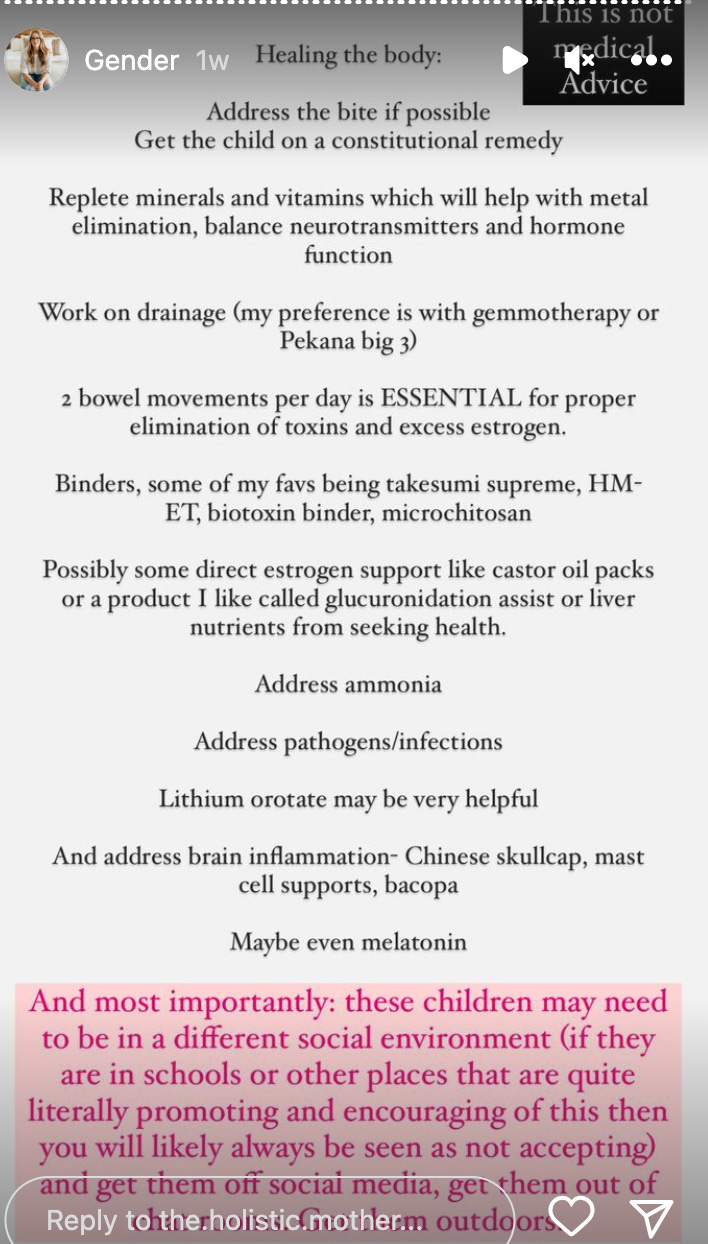The tyranny of gender binaries and the pathologization of ponytails
Guru Momfluencers Gone Wild - part 2
This newsletter is about constructions of motherhood, maternal ideals, and how we consume and perform those ideals online and off. This newsletter is not about parenting.
There are two reasons for this.
I’m primarily interested in motherhood as an identity and how our cultural assumptions and understandings of people doing the labor of mothering impact how we’re treated (and how we treat ourselves). From my viewpoint, parenting, which involves active value judgments and choices pertaining to raising children and motherhood as an identity marker are two different categories which only sometimes intersect.
I am not even close to knowing what the fuck I’m doing as a parent! I’m so happy other writers and thinkers are studying parenting so I don’t have to (and so I can think about my own parenting choices through a more informed lens thanks to their invaluable work).
But for this installment of Guru Momfluencers Gone Wild, I sort of can’t avoid talking about parenting, because, in addition to using her platform to preach about “femininity not feminism,” gut health, and the dangers of chemical sunscreen and mold, today’s guru momfluencer in question also shares tips for training children to adhere to rigid gender norms.
And while many of these strategies involve dietary and lifestyle changes rather than, for example, following parenting “scripts” in attempts to quell undesirable behavior, the basis of Kendra Needham’s advice stems from a concrete [mis]understanding of supportive, empathetic parenting.
In a highlights reel entitled “Gender,” Needham explains how, after an unspecified physical illness, her toddler daughter experienced concurrent “mental health” challenges. As far as I can tell, Needham interpreted her child’s emotional expression (“anger/yelling”), and her child’s disinterest in looking at herself in the mirror, wearing dresses, “looking pretty,” and wearing ponytails as evidence that something was wrong with the child. And by “wrong” I mean that Needham’s kid wasn’t performing her femme-ness or her gender according to Needham’s preferences, which are very much rooted in reductive, essentialist constructs of gender, and a belief that “men should be men” and “women should be women” (see her “Masc/Fem” highlights reel for more. Or don’t if you want to avoid a rage spiral!).
Still within the “Gender” reel, Needham goes on to explain how her son exhibited a disinterest in adhering to rigid masculine gender norms (he wanted to try on his sister’s clothing), but again, Needham “fixed him” by attending to his diet and gut health (presumably). I can’t help but wonder how much of her kid’s behavioral changes were due to supplements and how much they were due to his parents’ responses to him “acting VERY girly.”
Because of my aforementioned lack of expertise in child development and parenting, I thought it prudent to reach out to
, who writes the delightful, never judgmental or patronizing, newsletter, for her insight about children's emotional lives and their gender expression and identity. Melinda is a journalist who's covered science, parenting, and medicine for several years. She's written columns for Slate, The New York Times, and is a contributing editor at Scientific American magazine. She is a faculty member in the Science, Health & Environmental Reporting program at NYU’s Arthur L. Carter Journalism Institute. Melinda, in short, knows her shit!When it comes to supporting children in their gender expression, Melinda says this:
The science is clear that what’s harmful and wrong is the expectation that girls should like princesses and want to look pretty. Research suggests these gender stereotypes fuel sexism and sexual violence and increase the chance that girls will get low grades, develop symptoms of depression, and end up in abusive relationships.
Also, Needham is really off the mark when she suggests that her daughter’s rejection of gender stereotypes means that she isn’t “comfortable in her own skin.” If her daughter doesn’t like princesses or dresses, this doesn’t mean she wants to be a boy. It just means she’s rejecting our culture’s silly gendered expectations and stereotypes — and her daughter is wise for doing that, as these stereotypes are dangerous.
I’m glad that Melinda brought up the importance of data, science, and research because Needham too, talks much about data, science, and research! To back up her prescriptive guidance on gender expression and identity in children, Needham cites this paper on gender dysphoria which was written in 2019 and which has been retracted. She also cites this podcast, which is teeming with TERFy red flags.
Melinda had these additional thoughts about the validity of Needham’s sources, which she sums up as being “really, really bad science (if you can even call it science).” In addition to pointing out the misleading/inaccurate retracted studies, Melinda also noticed Needham’s mention of the work of Dietrich Klinghardt, who, she told me, is “a physician who has been written up in Quackwatch and was put on probation for years for his questionable medical practices.”
Cool!
While it’s pretty immediately clear that Needham’s definition of “reliable source material” is very different from mine and Melinda’s, I did my best to trace her logical framework to understand how she gets from symptom to cause to treatment. And according to my assessment of Needham’s “Gender” reel, it’s unclear what “causes” “gender confusion” in children. Maybe it’s mold. Maybe it’s Lyme Disease. Maybe it’s brain inflammation (of which Melinda told me she couldn’t find a “shred of science supporting Needham’s contention as a cause of gender dysphoria” ).Maybe it’s heavy metals. Maybe it’s the child’s “jaw/bite.” Maybe it’s hormonal disruption. Maybe it’s the pituitary gland. Maybe it’s cats?
Perhaps the most common “cause” of “gender confusion,” according to Needham, is something called Pediatric Acute-onset Neuropsychiatric Syndrome (PANS), which, according to Stanford Medicine, is “a clinical diagnosis given to children who have a dramatic – sometimes overnight – onset of neuropsychiatric symptoms including obsessions/compulsions or food restriction . . .The cause of PANS is unknown in most cases but is thought to be triggered by infections, metabolic disturbances, and other inflammatory reactions.”
While I’m even less qualified to speak as an expert about children’s physical and mental health than I am to speak as a parenting expert, it’s not clear to me from this definition of PANS how a child becoming upset when adults call her “cute” or becoming disinterested in “looking pretty” as a toddler, or a child wanting (or not wanting) to wear dresses qualify as symptoms of a neuropsychiatric syndrome.
Needham claims she doesn’t want to “fix gender confusion,” she simply wants to “heal” children’s . . . rage and anxiety? Which, according to her, is connected to brain inflammation which is connected to “gender confusion.” Again, I’m NO EXPERT, but as a person who has three kids, I can’t really imagine a day entirely free from most of the “symptoms” (read: emotions) Needham pathologizes in the above slide. Aren’t “big feelings” a basic tenet of childhood?
I asked Melinda, the star expert of this essay, to speak to emotional range in children, and she said this.
Big, fluctuating feelings are a normal and natural feature of childhood. Kids’ brains are very different from adult brains. Among other things, they have very little impulse control and few emotional regulation skills. Being upset, unhappy or just generally emotional is not a sign of a mental illness or that something needs to be “fixed.” Not wanting to “look pretty” or to wear dresses or to be called cute is not a sign of mental illness.
But for those of Needham’s followers who might be uncomfortable with their children’s “personality changes,” Needham offers a slide detailing the many ways parents can address (suppress?) their children’s preferences, behaviors, and habits when it comes to gender identity. It’s a long list, and you’ll notice Needham does the obligatory “I’m not a doctor” thing, which I think is supposed to protect her from many of the guru red flags I’m pointing out in this piece. Is she giving lots and lots of advice and claiming a certain level of authority in doing so by citing [dubious!!!] sources? Yes. But is she also protecting herself from any real culpability by prefacing all of her advice by clarifying that the advice is not “medical” advice? Yes.
(Not to be a total dick, but it’s the “maybe even melatonin” for me 💃)
It’s all well and good that Needham is demonstrating plausible deniability in case anyone acts on her “not medical” advice regarding children’s mental health and gender identity and expression, but it’s the type of thing that doesn’t really mean a whole lot when you consider the size and scope of her platform.
Needham has 176,000 followers on Instagram. That’s 176,000 people who might be wondering how they can best parent their children when those children exhibit emotions like anger and anxiety, or when they simply stop prioritizing “looking pretty.” That’s 176,000 who might read Needham’s highlight reel on “Gender,” and choose to act on her plethora of physical and mental health advice despite the fact that any clarity about Needham’s credentials is hard to come by.
Needham doesn’t appear to have her own website, but, like any good guru momfluencer, she makes up for lack of background transparency by selling a slew of stuff via her Linktree. She earns commission from her Amazon store, where she recommends cell salts (I don’t know) and gemmotherapy products (I don’t know). She’s a Beauty Counter ambassador (I wrote about MLMs and Beauty Counter here). She offers promo codes to places like this, which sells stuff to support gut health, and this, which sells “grass-fed organ” supplements.
And alongside Jennie Hogland (who does “mindset coaching), Needham sells a number of courses and “toolkits” with names like Holistic Care and Acute Viral Illness, Parasites and Susceptibility, and Holistic Pregnancy, Birth, and Postpartum Guide. In these course descriptions, she’s described as a HHP, which I think stands for Holistic Healthcare Provider. It’s hard to ascertain what sort of training a HHP needs. According to a website called Natural Healers dot com, there is no nationally agreed upon definition of what an HHP does or how an HHP should be trained. An HHP might study for a year. She might study for 4 years. She might earn a degree or certificate. She might not. Natural Healers dot com is right to point out that clients might be interested in an HHP’s background and credentials before trusting (and acting upon) their health advice. I’m certainly interested in Needham’s! But unfortunately for me, and for any of the 176,000 people following her on Instagram, Needham’s background is frustratingly nebulous considering how wide-reaching her “not medical” advice extends.
Most of us can agree that traditional western medicine certainly has its flaws, and alternative healing and wellness practices can totally be beneficial for some folks, which is great! But the lack of standardization in the holistic wellness space paves the way for people like Needham to thrive. And to cause harm.
, psychiatrist, author of Real Self-Care and founder of Gemma also empathizes with peoples' "desire to find answers in less mainstream sources," but had this to say about accreditation and expertise.The reality is that not all credential acronyms are created equal. For example, I am an MD. Anyone with those credentials had to do well enough in 4 years of college to make it through organic chemistry and pre-med curriculum to get into 4 years of medical school to take anatomy and physiology and biochemistry where they spend thousands of hours passing very rigorous exams, in order to spend another minimum of 4 years in residency training during which they rack up an average of 10,000 clinical hours taking care of patients. All MDs are required to have that same minimum of training to tack "MD" after their name. Just like any field, there is a variance on the individual level, but the rigorousness of the path to get there is standardized and there is also a level of oversight in terms of licensing, continuing education and professional ethics. The same cannot be said for coaching.
The potential for grift in some guru-led wellness spaces is compounded on social media and off because so many of these gurus emphasize the importance of “doing your own research” and “thinking for yourself” uninfluenced by Big Medicine, Big Pharma, and Big Sunscreen. By employing this type of rhetoric, they simultaneously uphold their authority as maverick thought leaders unwilling to be uncritical, uncurious “sheeple” and shame their followers for listening to and acting upon the advice of people who have spent several years committed to studying their areas of expertise, earning the relevant accreditation, and proving their credibility through continued training and peer review.
Real people read Kendra Needham’s Instagram posts. Real lives are impacted. What sort of outcomes can they expect if they follow Needham’s guidance and “treat” their children’s emotional expression and gender identity per her “not medical advice” suggestions?
According to research aggregated by the Human Rights Campaign, parental acceptance of gender identity and gender expression is quite literally critical to children’s lives.
According to a 2016 study published in LGBT Health, family rejection increases the odds of substance misuse and suicide attempts in transgender and gender non-conforming people. These results mirror research by Dr. Caitlin Ryan and the Family Acceptance Project, which found that LGBTQ youth whose families affirm their gender identity and sexual orientation are almost 50 percent less likely to make a suicide attempt compared to those whose families are unsupportive.
We have no way of knowing what’s going for Needham’s children regarding their gender identity, and not unsurprisingly, Needham skirts accusations of explicit transphobia by claiming to be solely concerned with children’s wellbeing and “comfort in their own skin,” and, of course, their gut health.
We also have no way of knowing what the experiences of the many children of the many people following Needham might be experiencing in terms of their gender identity. We do know, though, that parental support for gender non-conforming kids, gender curious kids, non-binary kids, and trans kids is one of the most important indicators of whether or not that kid will grow up happy and healthy.
Multiple studies show that supporting a child’s gender identity and expression will decrease that child’s risk of mental health struggles and decrease that child’s risk levels for suicide. And the risk levels of suicide for young trans people and young non-binary people can not be understated. According to a 2018 AAP study, “more than half of transgender male teens who participated in the survey reported attempting suicide in their lifetime, while 29.9 percent of transgender female teens said they attempted suicide. Among non-binary youth, 41.8 percent of respondents stated that they had attempted suicide at some point in their lives.”
To combat these grim statistics (and the reality of living in a culture entrenched in gender binaries), Melinda Wenner Moyer suggests the following to best support children.
Ask kids what they want and need and adopt their preferred gender pronouns. Research has shown that transgender and gender-expansive kids have higher self-esteem and fewer symptoms of depression when their parents support and affirm their identities.
What’s perhaps most clear to me about this whole tangled exploration of Needham’s “Gender” highlight reel has nothing to do with gut health or inflammation or toxins, it has to do with the inherent harm of gender binaries themselves. If we constrain all humans to either look and behave one of two possible ways, we are excluding and actively marginalizing an innumerable amount of people. We are shrinking our world and contributing to person erasure.
Melinda notes that by teaching children that girls and boys are fundamentally different in appearance, behavior, and ability, kids very quickly start to internalize these cultural norms and police them, both in themselves and in others.
In one study, researchers interviewed more than two hundred five-to-ten-year-olds about who they thought should be president of the United States and how they felt when they found out there had been no women presidents. One-fifth of the kids said they thought only men should be president, and more than one-third of kids under the age of nine believed it was actually illegal for a woman to be president. One nine-year-old boy said, “Men have courage and responsibility. Who knows what women would do?”
These gender stereotypes lead to other bad things, too. Research has shown that boys who adopt masculine “toughness” behaviors have less interest in school, lower self-esteem, lower math standardized test scores, and more symptoms of depression compared with boys who don’t. Girls who internalize the idea that their value stems from how they look get lower grades and have more symptoms of depression compared with girls who do not hold these beliefs.
One-third of kids under the age of nine believed it was actually illegal for a woman to be president. This sucks! This sucks for children’s individual senses of self, and it sucks for the culture at large. What happens when boys trained in toxic masculinity become adults unused to expressing emotional vulnerability and centering empathy? What happens when girls trained in submissive femininity grow up to view their self-worth as defined by their appearance and their ability to receive external validation? I keep coming back to Needham’s use of the word “heartbreaking” and I keep thinking about the outcome of Needham’s “successful” treatment of her daughter.
She combs her hair in front of the mirror now, likes princess again, smiles when she’s complimented, and now as of yesterday is proudly wearing dresses again.
By centering rigid gender norms instead of a child’s experience, emotional life, and identity, we are inherently communicating to children that they are less worthy and valuable than their ability to adhere to gendered behaviors and appearances, and that’s not only heartbreaking for those kids, it’s heartbreaking for the world.








Wow. Infuriating
This is really disturbing.